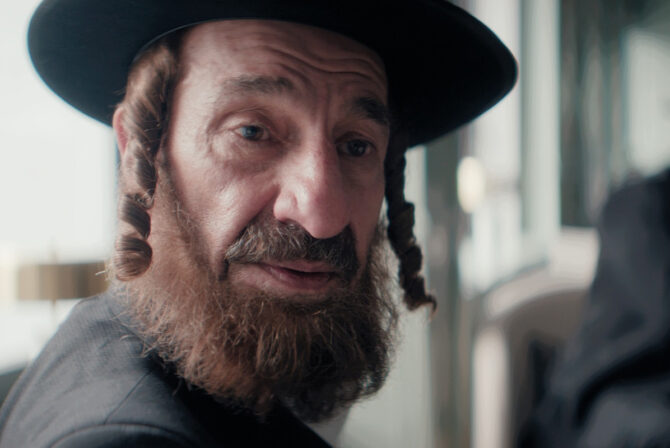Rabbi Hara Person remembers marching for abortion rights in Washington back in 1992 while she was pregnant with her daughter, holding up a sign that said “pregnant by choice.”
“I remember feeling very hopeful for the future, and for what her future was going [to be],” says Person, the first female chief executive of Central Conference of American Rabbis, to Kveller.
It’s been weeks since the Supreme Court ruled on Dobbs v. Jackson, effectively overturning Roe v. Wade and dashing Person’s – and many of our – dreams that the future will look brighter for our kids when it comes to reproductive access.
“Now I think this is actually going to be the fight of her generation. That is so depressing,” Person concedes. Yet, “as a rabbi, as a Jew, we always have to try to be optimistic.”
Rabbi Zoe McCoon, of Temple Beth Torah in Fremont, California, worked in reproductive health clinics before joining the clergy. McCoon wrote a pamphlet entitled “Tips for Clergy Providing Pastoral Care re: Abortion in a Potentially Post-Roe Era.” She says that it’s her “love of life, of joy and joyful occasions that inspires me to do this work, because [the experience of] bringing life into this world should be one of joy.”
Rabbi Kelly Levy of Congregation Beth Israel in Austin, Texas, has been living in a state where abortion access has been severely limited long before Dobbs, due to the passage of S.B. 8, the so-called “heartbeat bill,” in 2021, which prohibits abortion at 6 weeks. She’s one of the founding members of SACReD, a multi-faith organization fighting for reproductive rights in Texas. When I speak to her, she’s sleepless after a night of sleep regression from her 18-month-old baby. To her, that experience is the perfect illustration of why we fight for reproductive justice.
“I chose to bring this baby into the world. I choose every day to have her in my life, and this sleep regression is taking me at every single level. And for somebody who doesn’t choose to do this, who has that choice taken away from them, this goes towards their mental health and their anguish and their anxiety, and that, to me, is pikuach nefesh [the Jewish value of prioritizing life] is all about.”
As Jews, we are mostly, overwhelmingly pro-abortion. Eighty three percent of Jews in this country believe that abortion should be legal in all or most cases, according to Pew. And as Jews, we have a strong tradition of fighting for social justice. In this case, the activism needs to be for the long run. But how do we sustain our activism? And what should we actually do?
Kveller asked these three rabbis and moms who are using their pulpit to advocate for reproductive access what are some individual actions we can take to channel our rage and despair about Dobbs into action.
Donate to abortion funds
McCoon is part of NCJW’s Rabbis for Repro — the longtime feminist Jewish organization has an initiative called 73 Forward, whose tagline is “the next chapter of abortion access” — and she urges “individuals who want to feel as though they’re participating in something bigger to help support their Jewish Fund for Abortion Access in partnership with the National Abortion Federation.
“A number of people may be making their decisions based on whether they can afford it,” says Rabbi McCoon. “This is a way that we can support people wherever they live to access the abortions that they might be looking for, which includes perhaps funding for travel over state lines, funding for the procedure itself.”
Rabbi Person also recommends donating to National Network of Abortion Funds.
Yes, we know you’ve heard it before but — vote!
“It’s cliché, but voting matters,” says Rabbi Person. It’s not just about our leadership in Washington but “about who gets to be a judge, who gets to be in local politics, and then make state laws. And this matters so deeply — we can’t give up on the legislative process, despite the fact that we may feel like it has turned against us.”
Rabbi Person finds hope in the fact that the majority of Americans believe that a woman should have access to abortion and birth control — the number is currently 61%. But those numbers have to be represented at the polls.
Become involved locally
“I think it’s the local level where we can really make a difference,” Person says.
Person suggests “contacting governors and state legislators, just everyone endlessly to demand that they protect and expand abortion rights.
“It may sound like a useless thing to do in certain states,” Person admits, but she urges people to people to do it “over and over and over and over again and make it known that the constituents do not agree with these actions.”
“There is work to be done with our legislature, which includes needing to make calls and… perhaps get groups together to write letters,” McCoon says. There will also be a need for “mobilization around actually visiting our legislators and talking to them in person.
“We can be motivated by our Jewish values,” she says, “but do work that also translates to our secular world.”
Remind your Christian peers that this is an issue of religious freedom
“The conversation about when life begins is a deeply, deeply spiritual one where Judaism actually does not align with some of our Christian colleagues,” says McCoon. “So I think that it’s okay for us to say to our Christian colleagues and our Christian community members that we support [their beliefs], but for Judaism, we don’t actually see life starting at conception. So this is not just an issue around this particular subject, it’s not just about reproductive choice — it’s also about religious freedom.”
Keep talking about it
Lack of access to reproductive care “impacts every single person in this country, whether you think it does or not,” says Rabbi Levy, citing “the explosion of childcare needs, whether that’s medical or daycare resources.
“This is going to have an impact on jobs for people, this will have further impacts on our supply chain issues, on everything in this country,” Levy says. “We cannot stay silent about this and we absolutely must speak out for those who are unable to do so because that is our Jewish responsibility.”
Take time to recharge
“In my community, I’ve really been encouraging us to create space for the heartache that we feel,” says McCoon. “I think, when we are downtrodden and feel as though we’ve been hit with such a devastating blow, that if we ignore [the feeling], it’s going to bubble up somewhere else. So we need to be able to acknowledge ourselves and create space for one another. When we’re feeling overwhelmed, when we’re feeling grief and sadness, anger and hopelessness, we should do what we can to create space for ourselves and for others to receive the support that we need.”
Know that if you need abortion access, you have the support of the Jewish clergy and community
“We, as Jewish clergy, are aware of the fact that we are not divided into two categories: the people who have abortions and the people who are parents,” says McCoon. “I think that a lot of the narratives that have been uplifted in various publications have really [made] it almost black and white, you either have children or you have an abortion, and it’s important that Jewish parents who have experienced that this is not the case know that they are supported and loved by their Jewish communities.”
McCoon wants people to know that Jewish parents and people who seek, or who have sought, abortion and need support “will be able to find it in the majority of Jewish clergy members,” whether or not they are affiliated with any congregation.
“I think people are going to be coming to rabbis, especially rabbis in red states, asking to get abortions,” Person says. “I know that my colleagues want to be available to this, they want to use their discretionary funds to help women get to states where abortion is available, they want to help pay for it, and they want to help give pastoral support… they want to hook these women up with the organizations that will actually help them take those steps.”
Remember that this is an issue we are united about
Yes, not all Jews are categorically pro-choice, but even in Jewish Orthodoxy and ultra-Orthodoxy, there are varied opinions. Still, more than any religious group, we believe in access to abortion.
“There are certainly debates within Judaism,” Person acknowledges. “But all of that aside, Judaism recognizes that abortion is the right option at certain times. And moreover, Judaism doesn’t consider a fetus to have the same status as the live person carrying that fetus and… so that leads to very different kinds of choices about who makes decisions and whose life you are valuing in those decisions.”
She goes on to say that “it’s one of the issues that, as a Jewish community, we’re not divided on for the most part. Rabbis are speaking out, they’re using their pulpit because there are Jewish values that are deeply embedded in this issue. The issue of dignity — kavod habriyot, issues of autonomy, issues of equality, and issues of health. Judaism is such a pro-health tradition. So rabbis have a voice and they’re using it.”
Don’t give up!
We know it’s hard not to get carried away by your worries, and Rabbi Person feels that too: “I really worry about the future of this country, I worry about the possibilities that women may have or not have based on abortion, and honestly, access to birth control, because, you know, I mean, sounds like that could be a future issue with the court. And where are we then for God’s sakes? I mean, my great-grandmother was fighting for that 100 years ago. It is just devastating yet we can’t give up. We can’t stop fighting.
“Don’t give up, because good things have happened in this country through people really relentlessly pursuing justice,” she says.
Amen to that. Whenever I feel despair, it helps me to think that even though the Supreme Court and legislators do not value the health and the bodies of pregnant people — Jewish values and leaders care for our mental and physical health, and are keeping up the good fight. Let’s follow their lead.








